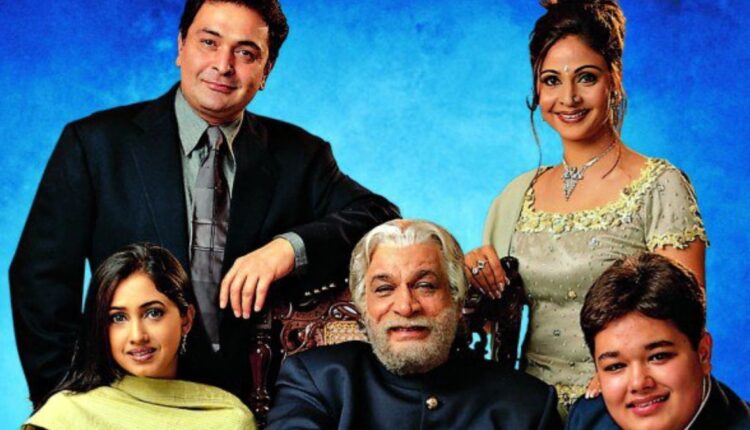From Yash Chopra’s Trishul to Karan Johar’s Kabhi Khushi Kabhie Gham to Shakespeare’s King Lear. Who but the zany David Dhawan has the audacity to take on such a wide spectrum of concerns and interests in one satiric arc? The grandmaster of guffaws, David Dhawan was going through a lean run in his repertoire of risible entertainment. Repetitive, laboured and often dull, Dhawan’s films lacked the sparkle that made his Aankhen and Shola Aur Shabnam writhe and cavort in humorous ecstasy.
In ‘Yeh Hai Jalwa’ Dhawan regained his funny form, though only to an extent. Evidence of that hurried, flurried storytelling, which ruined all his recent films like the horrendous Jodi No.1 and Hum Kissisi Kum Nahin, is scattered in Yeh Hai Jalwa. But Dhawan is far more in control of the cast and the comedy.
The story turns Trishul on its head. Raj (Salman Khan) is the overgrown Richie Rich who pants on the treadmill in his ritzy office while shooting off orders to a battery of staffers. Raj craves for his long-gone dad’s loving arms. After saying bye to the photograph of his garlanded mom (Poonam Dhillon in the shortest and most inert role since Raveena Tandon’s garlanded appearance in Raj Santoshi’s Damini), Raj picks up his nifty leather bag and takes off for London to woo and win Papa-dear.
Watch Salman Khan’s jaunty jig on the streets of London. Doesn’t he remind you of Hrithik Roshan in the second half of Kabhi Khushi Kabhie Gham? Hard as he tries to hide it, this is David Dhawan’s homage to Johar’s mega-family film, with Salman Khan in filtering papa Rishi Kapoor’s London home in Hrithik’s style.
The scenes where Raj wins over each member of his estranged dad Rajesh Mittal’s sprawling family is very familiar Dhawan territory. In a majority of his films, the middle-class rakish do-gooder barges into a monstrously overblown feudal household for a ‘crass’ course in socialism. The difference here, as driven in at the post-climax happy-reunion sequence, is the young protagonist is monstrously moneyed himself.
As the Beatles once said, all the orphaned Raju needs is love. And like Amitabh Bachchan in the sultry actioner Trishul, Raju will wrangle parental rights out of his father, by hook or crook. Before he gets it in dollops from his sullen dad, there’s plenty of crackling chemistry for us to savour between the two principal protagonists.
It’s astonishing how well Rishi Kapoor and Salman Khan vibe together. There’s a certain discomfort underlying their crackling and hissing chemistry, which goes well with the theme of an estranged son trying to make up for lost time with a father who’s moved on in life.
In fact, Kapoor and Khan are so much the complete pair that their respective romantic leads, Rati Agnihotri and Amisha Patel, seem redundant. After a pivotal part in Humraaz earlier this month, Patel is back playing the pert prop. She tries hard to substitute substance with effervescence. But the film is completely out of her orbit. Anupam Kher as her father is even more lost in Dhawan’s pace. The jokes regarding the shameful failure of Kher’s game show Sawaal Dus Crore Ka give us a little reason to giggle.
Rishi Kapoor and Salman Khan cook up a cute collaborative comedy. Some scenes, such as their drunken binge in a London restaurant or that touching moment when, after a business meeting with a disgruntled tycoon (played by producer Ketan Desai’s father-in-law, Shammi Kapoor), Khan plants a spontaneous peck on his papa’s cheek, are heartwarmingly vibrant and free of humbug.
Rishi Kapoor is a special treat to watch. He displays terrific comic timing and talent. Dhawan even pays homage to Kapoor’s stardom by making his screen son sing and play a tune from Subhash Ghai’s Karz. Such moments enthuse the narrative beyond its prescribed all’s-well-that-bends-well intentions. The film also borrows some of its NRI theme from Rishi Kapoor’s directorial venture Aa Ab Laut Chalen.
If there’s any other actor-factor worth mentioning, it is Kader Khan. He has done the benevolent Dadaji too often to miss a beat. But this versatile character can still swing a sunny surprise or two. In the climax where the entire family congregates for a hospital-corridor crisis, David Dhawan parodies Shakespeare’s King Lear and more directly, Bimal Roy’s Sujata, where the disgraced progeny saves the ailing parent’s life.
Yeh Hai Jalwa is a work of wispy attributes, hinging wholly on the Kapoor-Khan bacchanalia. Everything else, including Himesh Reshammiya’s music, takes a backseat.
Production values are below expectation. The garish sets are grossly ill-matched with the London outdoors. There are some grave continuity lapses, such as Salman Khan’s shaven head shining out of a cap in a fight sequence. In the climactic fight with villain Sharad Kapoor, Salman keeps clutching his abdomen, though his character undertakes a kidney transplant later in the narrative.
Sanjay Dutt’s guest appearance as a Punjabi do-gooder in London raises a few laughs. Interestingly, neither Salman Khan nor Sanjay Dutt bares their body for the camera. Quite a change from their beefy images. Though he’s far more comfortable doing comedy here than in any of Dhawan’s earlier films, Dutt’s role seems to be an afterthought to conquer box office insecurities. But the film doesn’t need to hardsell itself. You either warm up to the kookiest father-son pair ever seen in mainstream Hindi cinema.

